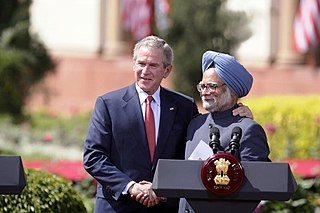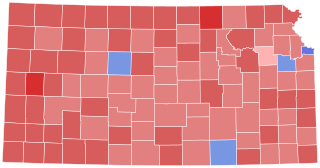
The Treaty on the Non-Proliferation of Nuclear Weapons, commonly known as the Non-Proliferation Treaty or NPT, is an international treaty whose objective is to prevent the spread of nuclear weapons and weapons technology, to promote cooperation in the peaceful uses of nuclear energy, and to further the goal of achieving nuclear disarmament and general and complete disarmament. Between 1965 and 1968, the treaty was negotiated by the Eighteen Nation Committee on Disarmament, a United Nations-sponsored organization based in Geneva, Switzerland.

Harriet Ellan Miers is an American lawyer who served as White House counsel to President George W. Bush from 2005 to 2007. A member of the Republican Party since 1988, she previously served as White House staff secretary from 2001 to 2003 and White House Deputy Chief of Staff for Policy from 2003 until 2005. In 2005, Miers was nominated by Bush to be an associate justice of the Supreme Court of the United States to replace retiring Justice Sandra Day O'Connor, but—in the face of bipartisan opposition—asked Bush to withdraw her nomination a little over three weeks after it was announced. In 2007, Miers returned to private practice, becoming a partner in the litigation and public policy group at Locke Lord.

A major non-NATO ally (MNNA) is a designation given by the United States government to countries that have strategic working relationships with the United States Armed Forces while not being members of the North Atlantic Treaty Organization (NATO). While the status does not automatically constitute a mutual defense pact with the United States, it does confer a variety of military and financial advantages that are otherwise unobtainable by non-NATO countries. There are currently 20 major non-NATO allies across four continents: 11 in Asia, 4 in Africa, 3 in South America, and 2 in Oceania.

Michele Jeanne Sison is an American diplomat and career member of the Senior Foreign Service who had served as the assistant secretary of state for international organization affairs. She has previously served in various other diplomatic posts around the world on behalf of the United States, including ambassador to Haiti. Sison holds the personal rank of career ambassador.
These are some of the notable events relating to politics in 2001.

Signed into U.S. law by President George W. Bush on October 18, 2004, the North Korean Human Rights Act was intended to promote human rights and freedom of North Korean refugees by:
- Providing humanitarian assistance to North Koreans inside North Korea;
- Providing grants to private, non-profit organizations to promote human rights, democracy, rule of law, and the development of a market economy in North Korea;
- Increasing the availability of information inside North Korea;
- Providing humanitarian or legal assistance to North Koreans who have fled North Korea.

Robin Lynn Raphel is an American former diplomat, ambassador, CIA analyst, lobbyist, and an expert on Pakistan affairs.

The 123 Agreement signed between the United States of America and India is known as the U.S.–India Civil Nuclear Agreement or Indo-US nuclear deal. The framework for this agreement was a July 18, 2005, joint statement by then Indian Prime Minister Manmohan Singh and then U.S. President George W. Bush, under which India agreed to separate its civil and military nuclear facilities and to place all its civil nuclear facilities under International Atomic Energy Agency (IAEA) safeguards and, in exchange, the United States agreed to work toward full civil nuclear cooperation with India. This U.S.-India deal took more than three years to come to fruition as it had to go through several complex stages, including amendment of U.S. domestic law, especially the Atomic Energy Act of 1954, a civil-military nuclear Separation Plan in India, an India-IAEA safeguards (inspections) agreement and the grant of an exemption for India by the Nuclear Suppliers Group, an export-control cartel that had been formed mainly in response to India's first nuclear test in 1974. In its final shape, the deal places under permanent safeguards those nuclear facilities that India has identified as "civil" and permits broad civil nuclear cooperation, while excluding the transfer of "sensitive" equipment and technologies, including civil enrichment and reprocessing items even under IAEA safeguards. On August 18, 2008, the IAEA Board of Governors approved, and on February 2, 2009, India signed an India-specific safeguards agreement with the IAEA. After India brought this agreement into force, inspections began in a phased manner on the 35 civilian nuclear installations India has identified in its Separation Plan. The deal is seen as a watershed in U.S.-India relations and introduces a new aspect to international nonproliferation efforts. On August 1, 2008, the IAEA approved the safeguards agreement with India, after which the United States approached the Nuclear Suppliers Group (NSG) to grant a waiver to India to commence civilian nuclear trade. The 48-nation NSG granted the waiver to India on September 6, 2008, allowing it to access civilian nuclear technology and fuel from other countries. The implementation of this waiver made India the only known country with nuclear weapons which is not a party to the Non-Proliferation Treaty (NPT) but is still allowed to carry out nuclear commerce with the rest of the world.

Richard Eugene Hoagland is a career ambassador in the United States Department of State. He was Principal Deputy Assistant Secretary in State's Bureau of South and Central Asian Affairs from 2013-2015. In the summer of 2016, based at the U.S. Embassy in Amman, Jordan, he was the senior U.S. liaison to the Russian Reconciliation Center at the Russian military base in Latakia, Syria. In 2017 he served as interim U.S. co-chair of the OSCE Minsk Group, the group appointed by the Organization for Security and Cooperation in Europe to coordinate international peace-making efforts on the conflict in Nagorno-Karabakh.

Pakistan and the United States established relations on 15 August 1947, a day after the independence of Pakistan, when the United States became one of the first nations to recognise the country.

Relations between India and the United States date back to India's independence movement and have continued well after independence from the United Kingdom in 1947. Currently, India and the United States enjoy close relations and have deepened collaboration on issues such as counterterrorism and countering Chinese influence in the Indo-Pacific.

Diane Catherine Goss Farrell currently serves as the Acting Deputy Under Secretary for International Trade in Washington, D.C. In this role, she oversees the daily operations of the International Trade Administration (ITA), which has an annual budget of $483 million with approximately 2,100 trade and investment professionals—based in more than 100 U.S. cities and 70 markets around the world. Farrell is a former Democratic candidate for Connecticut's 4th congressional district in 2004 and 2006.
Karl Frederick Inderfurth is an American diplomat. He was the assistant secretary of state for South Asian affairs from August 1997 to January 2001. In his capacity as assistant secretary, Inderfurth was responsible for US policy regarding Afghanistan, Bangladesh, Bhutan, India, Maldives, Nepal, Pakistan, and Sri Lanka. Prior to his appointment as assistant secretary, Inderfurth served as the U.S. representative for special political affairs to the United Nations, with the rank of ambassador. In this capacity, he dealt with issues such as UN peacekeeping, disarmament, nuclear proliferation and security affairs. Inderfurth also served as deputy U.S. representative on the United Nations Security Council.

The United States Ambassador-at-Large for International Religious Freedom is the ambassador-at-large who heads the Office of International Religious Freedom in the U.S. Department of State.
For purposes of U.S. foreign policy, South Asia consists of Bangladesh, Bhutan, India, the Maldives, Nepal, Pakistan, and Sri Lanka. The assistant secretary of State for South and Central Asian affairs was Nisha Desai Biswal.

The 1996 United States Senate special election in Kansas was held November 5, 1996, concurrently with the presidential election and the regularly scheduled election for the state's Class 2 seat. Incumbent Republican U.S. Senator and Senate Majority Leader Bob Dole, the Republican nominee for president, had resigned on June 11, 1996, in order to focus on his presidential campaign. Lieutenant Governor Sheila Frahm was appointed to the seat upon Dole's resignation, but she was defeated in the primary by Representative Sam Brownback, who went on to win the general election over Democrat Jill Docking.

Donald Lu is a United States diplomat who had served as Assistant Secretary of State for South and Central Asian Affairs. He previously served as both the United States Ambassador to Kyrgyzstan from 2018 to 2021 and the United States Ambassador to Albania from 2015 to 2018.

Nisha Biswal, is an American businesswoman and public official in the United States. Biswal is the Deputy CEO of the U.S. International Development Finance Corporation. She previously served as Senior Vice President for international strategy and global initiatives and oversees South Asia programs at the United States Chamber of Commerce. Prior to this, she served as the President of the US-India Business Council at the US Chamber of Commerce. Previously, she has also served as Assistant Secretary of State for South and Central Asian Affairs in the United States Department of State under President Barack Obama from 2013 to 2017. Biswal was the first Indian-American to hold this position. She oversaw the U.S.–India strategic partnership during a period of unprecedented cooperation, including the launch of an annual U.S.–India Strategic and Commercial Dialogue. Biswal was awarded the prestigious Samman Award by the President of India in January 2017. Biswal was also instrumental in launching the US-Bangladesh Partnership Dialogue, the C5+1 Dialogue between the United States and the Central Asian States of Kazakhstan, Kyrgyzstan, Tajikistan, Turkmenistan and Uzbekistan. Biswal also serves on the United States Institute of Peace International Advisory Council, on the Afghanistan Study Group and is on the Board of Directors for the Institute for Sustainable Communities, the Leadership Council for Women in National Security and is active in Democratic politics.

Eight presidents of the United States have made presidential visits to South Asia. The first trip by a sitting president to South Asia was by Dwight D. Eisenhower in 1959. Of the eight countries in the region, only 4 of them have been visited by a sitting American president: Afghanistan, Bangladesh, India and Pakistan. The other four countries, Bhutan, the Maldives, Nepal and Sri Lanka, have never been visited by a sitting American president.

The military relations between Pakistan and the United States have been present since the two established diplomatic relations in 1947. The United States and Pakistan's military have historically close ties and it was once called "America's most allied ally in Asia" by Dwight D. Eisenhower, reflecting shared interests in security and stability in South Asia, Central Asia as well as in regions covering Eastern Europe.
















